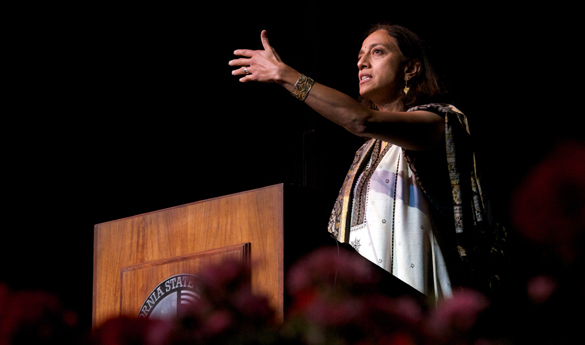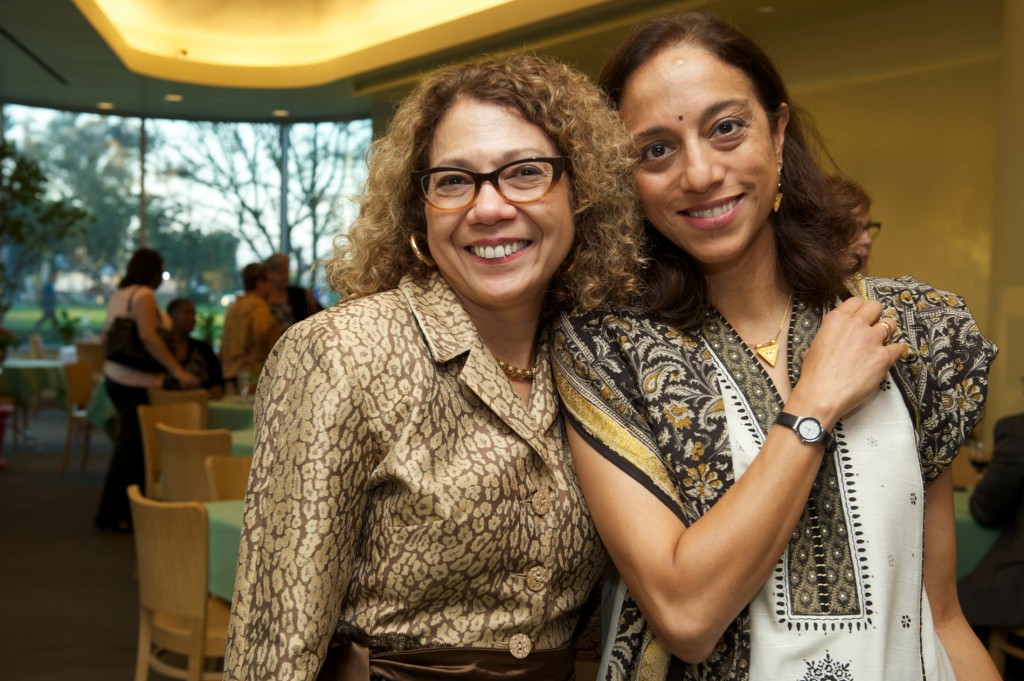Kavita Ramdas, former president and CEO of Global Fund for Women, was featured on Sept. 29 as the guest speaker for the second presentation of the Presidential Lecture Series at California State University, Dominguez Hills. President Mildred García invited Ramdas to the university after hearing her speak at the annual meeting of American Association of Colleges and Universities (AACU) earlier this year.

“Kavita was the keynote speaker, and her comments were powerful, relevant, and important as the world becomes smaller and much more connected,” said García, who serves on the AACU board of trustees. “At CSU Dominguez Hills, where 70 percent of our students are women, 50 percent of the vice presidents are women, 66 percent of the cabinet [members] are women, and all of our academic affairs deans are women, her comments on women’s issues will make us take a step back and think about issues of women around the globe. Kavita has spent her professional life shaping a world where gender equality can help ensure human rights and dignity for all of us.”
Ramdas delivered her talk, “It Ain’t What You Do, It’s How You Do It: Global Education for Gender Justice,” to students and members of the campus and local community in the University Theatre. She thanked President García and those who invited her to CSU Dominguez Hills and commended the university for being “committed to making positive change in the world.”
“It does seem to be hard in some ways when you are walking around this beautiful campus to think that this is part of the rest of the world,” she said. “But having reviewed your Website, having walked around the campus, having realized how engaged your faculty and students are with the world, it seems to me that you are not only connected and concerned.”
Outlining recent world headlines, including the recent decree by King Abdullah of Saudi Arabia that allowed women the right to vote and run for office to rape charges filed against Dominique Strauss-Kahn by French journalist Tristane Banon, Ramdas underscored the importance of overcoming all difference–especially that of gender–when tacking national and global dilemmas.

“The challenges that we face… a recession, climate change, militarization, poverty, or disease, are global in nature,” said Ramdas. “They are produced by forces that transcend ordinary boundaries or divisions based on race, ethnicity, nationality, or gender. And accordingly, they can only be solved if we tackle them at the global level.”
Ramdas, who serves on the Council of Advisors on Gender Equity at the Woodrow Wilson School of Public and International Affairs at Princeton University, and is a visiting fellow at the Center for Democracy, Development and the Rule of Law in the Freeman Spogli Institute for International Studies at Stanford University, exhorted her academic colleagues and their students to overcome “values and assumptions which consciously or unconsciously can and will have both good and bad consequences.”
“Education offers the only real hope of meeting and overcoming these global challenges,” she said. “But–and this is where the ‘how you do it’ becomes critical–in order to do so, this education has to be something quite different from what we’ve seen. It has to be imaginative, it has to be inclusive, it has to be fully cognizant of the deep inequalities around the world that persist, especially the persistence of gender equality, which continues to deny close to half of humanity their most basic human rights…. A truly effective global education is likely to be one that is both feminine and feminist, opening our world to possibilities that we haven’t even been able to imagine as yet.”
Ramdas addressed the worldwide technology race, as discussed by President Barack Obama in his state of the union address earlier this year. She contrasted the president’s remarks about not accepting “second place” for the United States by proposing a different perspective.
“You can only be first or second if you are standing on 51st or 52nd [Street], or if you’re standing in a line,” she said. “The United States doesn’t have to be first. Neither does India, nor does China or Germany. We could choose instead, to stand in a circle. The circle does not have firsts or seconds and it has to be able to replace the line in our education, values, and principles, if we have any shot at facing the… crises and challenges that we face today.”
Ramdas serves on the Global Development Program Advisory Panel to the Bill & Melinda Gates Foundation and has been interviewed widely for her expertise and commentary on issues of social entrepreneurship, development, women’s leadership, education, health, and philanthropy.
García established the Presidential Lecture Series during the university’s 50th anniversary year in 2010 to provide a forum for students, faculty, staff and the surrounding community to hear from national and international leaders and explore the most compelling issues of the day. Former Housing and Urban Development secretary under President Bill Clinton, Dr. Henry Cisneros, was the series’ first speaker.